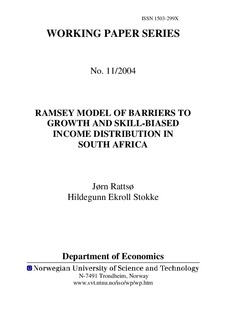Ramsey Model of Barriers to Growth and Skill-Based Income Distribution in South Africa
Research report
Permanent lenke
http://hdl.handle.net/11250/267115Utgivelsesdato
2004Metadata
Vis full innførselSamlinger
Sammendrag
The paper integrates two mechanisms of economic growth, barriers to international spillovers and skill-biased effects on the income distribution. South Africa is an interesting case study because of dramatic changes in international barriers over time and policy focus to productivity and distribution. Barriers affect the balance between innovation and adoption in the productivity growth and thereby the skill-bias. The productivity dynamics and the distributional implications are investigated in an intertemporal Ramsey growth model. The model offers a calibrated tariff-equivalence measure of the sanction effect and allows for counterfactual analysis of no-sanctions. Increased openness is shown to reduce barriers to technology adoption leading to skill-biased economic growth and worsened income distribution. The result is consistent with the observation that economic growth under sanctions has been slow and with an increase in the relative wage of unskilled labor. The tradeoff between barriers and skill-bias, foreign spillover driven productivity growth and income distribution, obviously is a challenge for growth policy.
